#knives analysis
Text
One of my favorite metaphors of Glass Onion is the Mona Lisa vs the Glass Onion.
Miles is constantly comparing himself, whether directly or indirectly, to the Mona Lisa. He wants to be “forever remembered in the same breath” as her. He plays up the mystery and the complexity of the painting, the artistry, the skill and the knowledge that went into it; All traits that he wants others to see in him.
But when Miles is describing the painting, who gets the closeup shot? Not Miles, but Helen. Helen is the one who gets multiple shots throughout the movie mirroring the Mona Lisa- same pose, same unreadable expression.
Because Miles isn’t the Mona Lisa, however much he wishes he was. Miles is the Glass Onion. Something trying to look complex and layered on the outside, when in reality, the center is in plain sight. Miles isn’t some enigmatic genius, he is exactly what he appears to be at first glance: an idiotic, rich, egotistical, shithead.
He didn’t make his own puzzles, he didn’t write his own murder, he didn’t create his own art, he didn’t even come up with the idea for his company. His island is filled with things made by other people. He isn’t even the person who did the thing that will forever connect him to the Mona Lisa. The thing that will forever tie him to Helen Brand.
Helen is the one with complexity. Helen is the one surrounded by mystery. Helen is the one who’s more than meets the eye. Helen is the Mona Lisa, and the Mona Lisa destroyed herself to take down Miles Bron.
#glass onion#knives out#miles bron#helen brand#I could talk about all the symbolism and metaphor in this movie for hours#movie analysis#wordificating
13K notes
·
View notes
Text
Glass Onion Spoilers - Foreshadowing and Among Us
I’ve seen a few posts dunking on glass onion for being “cringe” because of the Among Us scene and a few praising it for accurately reflecting the fact that this is all everyone was playing in 2020, but I haven’t seen anyone really talk about how brilliantly Among Us works as a foreshadowing/storytelling device.
On the surface - as the film itself points out! - the game is a neat little parallel of the island: one murderer hidden among us, with the objective being to find them out. But this comparison goes far deeper than the basic premise of the film.
Firstly, Benoit appears as the game’s imposter, and then, it is later revealed, is literally an imposter, arriving on the island uninvited under false pretences - one of the first major twists of the film spelled out to the audience in the opening act. And he isn’t alone - just as two imposters generally work together to deceive the other players, so Benoit and Helen work together to infiltrate the group.
BUT, and this is the bit that really drives me wild, the endgame format of Among Us perfectly reflects the endgame of the film. The way to win Among Us isn’t necessarily a case of killing everyone or surviving every round - the way to win is by convincing your fellow players to believe you, and to vote accordingly.
During the trial Andi loses because the imposter - the billionaire impersonating a genius - convinces the other players that she should be voted out; she is as effectively thrown out of the airlock as she is the business, and then literally killed to protect the [fortune of] the “crew.”
But, Andi was not the imposter, and so the game continues.
The imposter kills again, and when Miles confesses to causing the lights to go out, this is another excellent hint - only the imposter can sabotage the lights!
Then, with all the characters assembled much like an “Emergency Meeting,” we reach the climax of the film: Miles burns the napkin evidence, and immediately the ensemble is back to the voting booth as Helen, like her sister, fights for the players’ support in voting out the imposter. Any Among Us player will recognise the infuriating feeling when you literally just saw them vent for the love of god you were all there vote them OFF- and that frustration - of speaking the truth and not being believed - is evident in this scene.
But these players don’t care about the truth; they care about surviving (ie staying rich), and so they will vote off an innocent person to placate the shark. Which is absolutely not how you win the game.
Then, then, the game’s final round: the imposter has lost his tools, is revealed for the useless fraud he is, and it’s when he has nothing left to offer the other players that one more vote is held - the characters literally raise their hands as they pledge their support to Helen, in part to give the appearance of swearing in upon the witness stand, but also in part to give the visual of a literal vote... such as that of an Among Us emergency meeting vote.

And it’s when Miles is finally, rightfully ejected that at last, the game is won.
Among Us is a game of social engineering, of lying and convincing others of your lies to prolong your survival, deception, and the malleability of truth. Presenting this game in the opening of the film is more than a gimmick or scene-setter: it illustrates the social structures at the heart of the story.
TLDR: Among Us foreshadows the film’s premise, but also plot twists, character choices, and significantly the film’s resolution by way of group vote.
#glass onion#Knives Out#glass onion spoilers#rian johnson#netflix#benoit blanc#among us#i didnt stop to check specific details beyond character names so if i fudged a detail we are simply going to have to live with it#in this house we delight in and enjoy indie game references that also work as storytelling devices#too busy having fun to be cringe rn#i havent written this much analysis for anything since leaving uni#also fuck netflix's no screenshot policy
7K notes
·
View notes
Text
something about glass onion that makes me go insane is first the movie starts with Bach’s ‘little’ fugue in G minor, then the box miles sends to each of the ‘shitheads’ has it as one of the clues. Don’t exactly remember who says it but someone says that fugues are a complicated layer of music. While they are layered they are not fundamentally complicated, it’s just layers of the same figure played over and over again. The fundamental core melody is all the same. Which is a perfect melody for Miles thinking his plan and puzzles was this complicated system of music, when it’s really just the same story told over and over again, and also a metaphor for the glass onion itself. I dunno I just love when classical music is used in movies that itself tells the story in a deeper way
#glass onion#miles bron#benoit blanc#knives out#glass onion spoilers#this is a really simple analysis but look#i’m a big nerd for music history and reusing old pieces in new and interesting ways#ITS JUST COOL OK#can you tell i’m brainrotting over this
6K notes
·
View notes
Text
i wish more people would realise that everytime we see kotoko's "anger" in deep cover we also see her scared at the same time. like
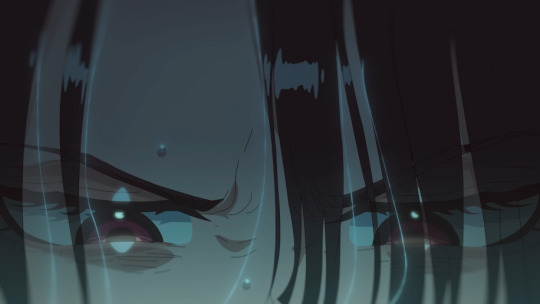

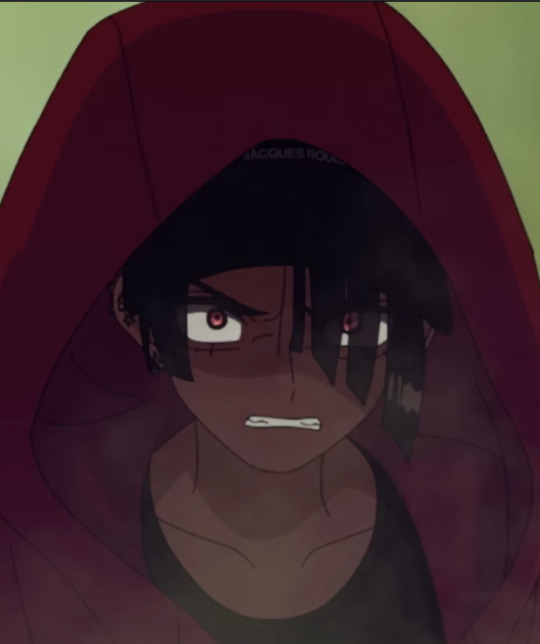


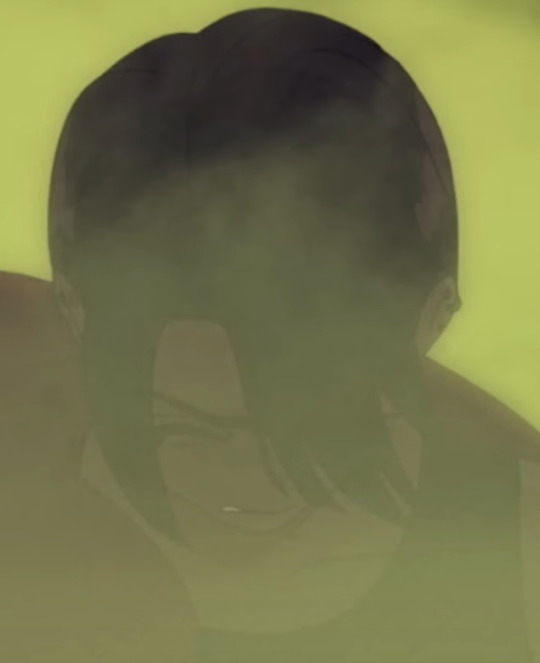

almost like her anger is all she has in order to stop herself from being terrified! almost like her anger is one of her last lines of defense! almost like if you took away her anger you would leave her flayed open and bleeding and lost! like its become one of the only things that have kept her from breaking! or even that she fears her own anger thats become a far bigger part of herself than she can control! hmmmm. HMMMMMMMMM.
#UNDERSTAND MY VISIONS BOY. KOTOKO IS AN ANGRY PERSON YES BUT BELOW THE ANGER LIES A PERSON UNRAVELING AT THE SEAMS AND SCREAMING TO BE SEEN#YOUR HONOUR SHE IS JUST A GIRL AS SAID BY KNIVES#BELOW HER ANGER IS A DEEP COMPLEX TERROR OF WHAT SHE IS AND WHAT SHES BECOME AND WHATS ALREADY HAPPENED OR IS HAPPENING TO HER.#milgram#kotoko yuzuriha#yuzuriha kotoko#milgram analysis#? i guess. a bit. i mostly just wanted to point out how kotoko is scared scared scared scared#i also dont particularly tend to see that first scene in those first images as kotoko being “angry”. but i know some do so whatever
267 notes
·
View notes
Text
so, in the manga…
did Vash really have a romantic interest in Meryl?
spoiler alert: Trigun manga, Trigun Maximum

In the case of Meryl, there are several signs she has developed feelings for him. She accepts it and lets Vash be himself.
Mmm with Vash it’s hard to answer…
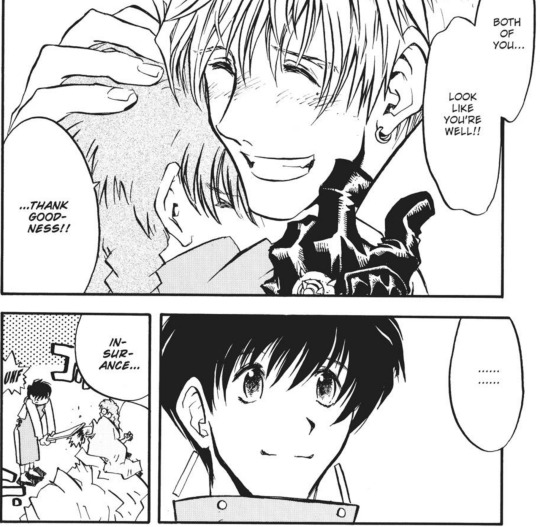
We see they’re good friends…she can be a bit tough with him but Vash always smiles to her.
I think that’s really sweet and he acts like that with everyone…
BUT
When Zasie kidnapped Meryl, Vash goes to rescue her and yes, that is something he could do for anyone who needs his help…but in Trigun Maximum chapter 28 when Vash suffers remembering all July’s tragedy…he thinks about Meryl in danger and keeps going.

And when he finally finds her in chapter 29, the worry and fear in his face is undeniable.
Then, there’s something really interesting FOR HIM happening after that.

Meryl witnesses July’s tragedy in a memory…and then she begins to be afraid every time she sees Vash in his angel form.

After seeing her so frightened, Vash says he feels like crying…
That could have separate them…
BUT

Vash receives a revolver from Meryl, being really surprised that she still wants to look after him, and smiles…relieved.
Meryl continues by his side, even after seeing his scariest power…and cares about him no matter the circumstances.
If we look for a romantic relationship…I think this is more complicated than that.
Oxford Languages defines romance as a feeling of excitement and mystery associated with love.
We can’t say Vash is excited or nervous about Meryl…All we see is Vash nervous about Meryl crying most likely because he doesn’t know what to do, but that’s all (and that’s really cute).
Instead of that, Vash could be more oriented to “love” instead of “romance”.
But for someone like him, who is 150 years old, full of sorrows and regrets…what does “love” mean?

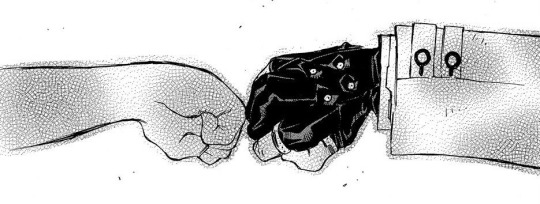
Cambridge Dictionary says:
Love is used to describe all strong feelings of closeness and care between two people.
After all they have been though together, they developed really strong feelings for each other, especially closeness and care.
And there is this moment, one of the most precious to me in this relationship.
Almost at the end, Vash is going to confront Knives but he makes a promise to Meryl before he leaves.
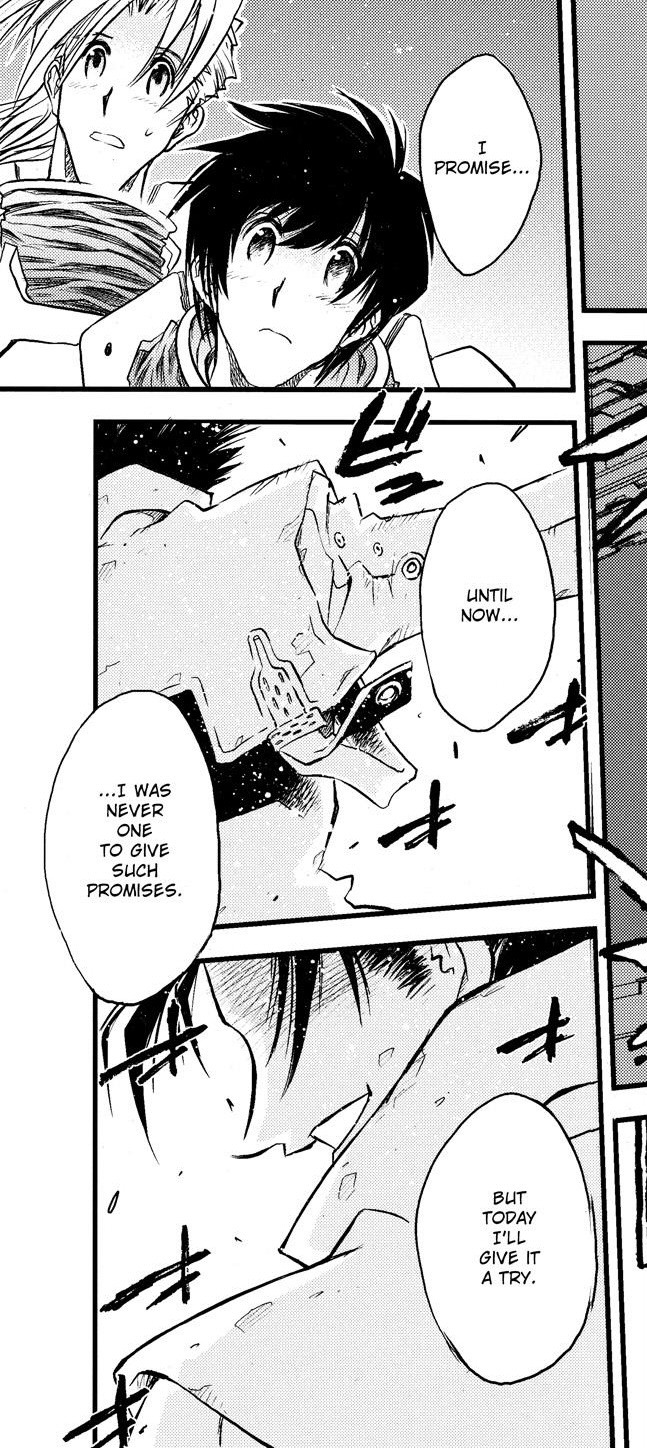

(Yes, we know he was a bit late but remember he was really injured, he had to heal at human speed at that time…but he was already on his way when he was found again).
He could have made promises many other times in his life but here he doesn’t only says he will return. He, who never asks nothing from anyone, asks her to wait for him.
Ok yes, he may be capable of love all humans…but he has always been a lonely wolf. He has friends, but he always travels alone.
It is until he meets Wolfwood and Meryl that he wants to stay with someone.
And Meryl is the one Vash wants to wait for his return.
#trigun#trigun stampede#vash the stampede#vash#questions#vash stampede#meryl stryfe#million knives#millions knives#trigun spoilers#trigun manga#trigun manga spoilers#trigun vash#ts spoilers#trigun maximum#trigun analysis#trigun maximum spoilers#vashmeryl#vash x meryl
1K notes
·
View notes
Text
So after reading this thread by @mydetheturk and @shastafirecracker, I got to thinking about Vash as a gun in Trigun Stampede. (I would have responded in thread, but the thread is Trigun Book Club and I'm about to get into spoilers for Stampede here. Which reminds me....)
Spoilers for Trigun Stampede Ahead
The series is called Trigun because Vash has three guns: 1) the one he carries, 2) the one in his prosthetic left arm, and 3) his angel arm. The thread linked above gets into how, throughout Trigun (every iteration, TBH), Vash doesn't simply wield weapons, but because of his angel arm he very literally is a weapon, and that's an identity he resists as much as he can. He doesn't want to be used for violence. He just wants to help people, but his very nature makes pursuing that path a rather difficult one.
In particular, once he's aware of its presence, Vash wants to take every precaution he can to stop from releasing the power that channels through his angel arm, which is understandable since it can literally level cities. That destructive power the antithesis of what Vash wants to be, but it's also an irremovable part of himself... and it's something that Knives covets enough to severely violate Vash in attempt to gain control of it. The power itself might be Vash's, but it's Knives who activates it, forces it into being, and thus compels Vash to both channel it into his angel arm and to pull the trigger on that insanely powerful gun.
However, in Stampede, it's not just the weight of the angel arm that Knives forces on Vash. Knives is literally responsible for Vash having the other two guns, as well.
These can both be traced to episode 9. First, Knives thrusts the handgun into Vash's arms, calling it, "An evil weapon of the Sinners, taking lives easily from afar with the twitch of a finger...."

Nominally, he's doing this to protect Vash. Vash won't raise his hand to take down the humans that literally just overclocked their sisters to death, to protect them or to protect himself, so Knives provides him with a weapon he labels a coward's tool for evil (gun #1). In doing that, he very much implies his brother is both a coward and someone who needs to embrace doing evil in order to survive.
It's only a few minutes later that Knives makes way for the second gun.
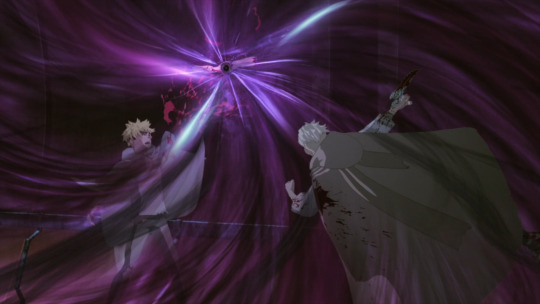
Knives slices off Vash's arm to protect him from the power Vash (accidentally) summoned to try to protect Luida from Knives, thus making way for Vash's prosthetic arm (gun #2).
Thus, every shot fired by Vash from either the handgun or the prosthetic is the result of Knives' actions, even when Knives isn't actively sending people to harass Vash.
"But wait," you hypothetically say. "In TriStamp, Vash's prosthetic arm has a grappling gun, not a gun that fires bullets."
You're right.
Interesting that the one gun Vash has the option to choose for himself in Stampede isn't designed for killing. Instead, Vash uses it to try and save himself, and to save Meryl.
(Though all things considered, I wouldn't be surprised if whatever upgrade he has in Season 2 is more in line with what fans of previous Trigun series are used to in his prosthetic arm.)
There's one other thing I'll note before wrapping this up. Going back to Episode 9 of Stampede... Vash is actually very quick to try and use that handgun Knives gives him. But he doesn't use it to defend himself from humans (or anyone else, really) the way Knives wants him to. Instead, he grits his teeth, does his best to steady an unsteady hand, and uses it to try and protect one of the only two humans left standing around them, Luida, from Knives.


#he is constantly CONSTANTLY resisting becoming just a tool for violence#especially a tool for violence against humanity#even when he has every reason to just give up and watch them burn#vash the stampede#millions knives#trigun stampede#anime analysis#pancake analysis
453 notes
·
View notes
Text
Okay I need to rant about Glass Onion for several paragraphs
WARNING: SPOILERS!
Glass onion is phenomenal, and I personally enjoyed its themes more than the first Knives Out movie.
Now don’t get me wrong, Knives Out is arguably the better film, but its strengths lie in the complexity and brilliant execution of its core mystery. It’s a fantastic self-contained story about a shitty rich family and the people they directly affect. The members of the family range across the political spectrum and all express different ideologies, but the moment a migrant working-class woman has a legitimized shot at their inheritance they band together to prevent her from improving her life. It's interesting commentary on how wealthy people can talk a big game about helping others and being good people, but ultimately fall morally short when such actions threaten what they feel they “rightfully deserve.” But that's arguably the limitation of the film as its focus is entirely on the interpersonal conflict between the Thrombey family and Marta.
Glass onion isn’t limited by that.
The entire thematic core of Glass Onion concerns the damage that the rich and powerful can do to the world if they aren’t supervised, criticized, or limited.
Aside from our lovely detective Benoit Blanc, the murdered Andi Brand, and her twin sister Helen, all of the characters are shitty people that are damaging the world in a uniquely horrible way as a direct consequence of the unchecked power and wealth they wield.
To start we have Governor Claire Dubella. Her success in her political career has relied almost entirely on monetary support and influence from the films big bad and Elon Musk/Jeff Bezos analogue Miles Bron. Her platform has good objectives, and she’s passionate about hard topics like climate change, but her ability to act is entirely limited by the influence Miles has on her. If Miles wants her to do something, she feels like she has no choice but to, which results in her greenlighting an experimental powerplant that Miles wants built to advocate for his new fuel source. It’s untested technology, it’s volatile and dangerous as fuck, and Claire feels like she has no choice but to go along with it because if she doesn’t Miles will withdraw support from her career, or worse, support her opponents. She likens it to selling her soul, and it really is. She willingly undermined the health of her constituents for the sake of saving her career, and the shitty part is that Miles only controls her because she lets him. She could deny the power plant, or leave Miles, at any time, but she doesn’t because she perceives the personal risk as to great. She is a politician that won’t stand up for the people she represents, and no one calls her out on it.
Next, we have Duke Cody, the Alpha male men’s rights streamer who is just like, the absolute worst person in this film. His views and opinions are incredibly toxic, his actions and beliefs directly hurt the people he influences through the hurtful products he promotes, and thanks to Mile's wealth and influence both he and his terrible, terrible, terrible opinions have official backing and some form of legitimacy. He’s almost the direct inverse of Claire, being someone who really shouldn’t have support, but is getting it anyway because he’s Mile’s friend. And because Miles doesn’t care and is giving Duke support and helping him dodge legal trouble, he enables Dukes terrible opinions and lets them influence and hurt people.
Then we have Birdie, my personal favorite of the disruptors. She is a fashion designer, media star, and breathtakingly, beautifully, stupid. She’s not actively malicious like some of the other characters, but she is just so fundamentally incapable of thinking things through. When paired with her wealth and influence, this results in horrifying real-world consequences. She has her iconic fashion line of sweatpants made at the most infamous sweatshop in Bangladesh not because she doesn’t care, but because she thought a sweatshop is just a shop where you make sweatpants. She’s just very stupid, but at the very least has the decency to be aware of it. She even decides to own up to her Bangladesh mistake of her own volition, independent of the plot. The problem is that no one corrected for her, or guided her, or worked to influence her decisions. Miles just cared about what her brands could do for him and was perfectly willing to throw her under the bus to preserve his image.
Last of the four Disruptors is Lionel Toussaint. Not much to say about him actually, he’s fairly straightforward. He works directly under Miles as a scientist and is a parallel for the people that want to have confidence in tech ‘pioneers’ like Elon Musk. After all they’ve been successful, and things have worked out in the past, surely, we can give them leeway with new technology development. But there’s a reason why technology is prototyped and tested, and that’s because things always go wrong, and you need to take time and care to figure out how to ensure new technology is safe.
Which leads us to this asshole.
Miles goddamn Mona Lisa Burning Bron.
The absolute, motherfucking, shithead moron directly responsible for everything bad that happens in this film.
I lied about Duke Cody because this absolute buffoon is the actually the worst person in this film.
He manipulates politicians into endangering their constituents for his own gain, he enables the absolute worst and most toxic people by giving them legitimate platforms, he promotes influencers without caring for what their unchecked actions result in, and he deludes the people that work for him and want to believe in him with self-assured delusion. This man is arrogant, an indiscribable moron (worse than Birdie because at least she acknowledges her failings), dangerously delusional, obsessed with control, and most damning of all, unchecked.
Miles Bron is a direct look at how too much unchecked power, wealth, and influence results in unmitigated disasters. He doesn’t care about helping people, because he doesn’t take the time to make sure untested technology is safe for the public, handwaving legitimate concerns with denial and false assurance. He doesn’t care about his friends, because he murders two of them the instant, they become a threat to his control. He’s not smart, because all of his genius is the result of other people, he’s just skilled at advertising it as his own to get the credit. All he cares about is doing what he wants and being in control, because his opinion and self-worth and legacy is more precious to him than any other thing in the world. The man is a lie so absolute, so convoluted, and so stupidly straightforward that the slightest piece of truth will bring the facade of his existence crumbling down. And it’s hard to acknowledge something like that in the real world because someone that successful being that malicious and dumb sounds incredibly stupid. It’s an easy lie to buy because it’s more believable than how stupid the truth is.
Anyway, ultimately my conclusion is that we see a strikingly accurate portrayal of Jeff Bezos and Elon Musk in this film, and it was very cathartic seeing their hopes, ambitions, and house burn down around them. Because billionaires like them are shithead morons that lie to and manipulate everyone, and their arrogant and harmful self-delusions compound through the people they manage to influence.
Thanks for coming to my Ted Talk.
#knives out#glass onion#benoit blanc#film#mystery film#movie review#elon musk#jeff bezos#Need a hard kick in the nuts#literary analysis#movies#netflix#eat the fucking rich#can't believe a murder mystery radicalized me#rambling
1K notes
·
View notes
Text
I feel like Kyouka and Akutagawa are actually incredibly similar and would get along extremely well if not for the circumstances. I mean, they think so much alike! In Dead Apple you would figure Kyouka still hated Akutagawa yet when he went “I'll go kill Dazai-san” she was just like. yeah I'll tag along. Not to mention how Akutagawa literally can't deliver two lines to Kyouka without praising her / showing that he's proud of her? He's always like “Sentenced to death? Nothing of the sort. You've accomplished your mission.” (chapter 9) “You're coming home” (chapter 9) *Smiles somewhat proudly at Kyouka when she points a gun at him* (chapter 11) “Let me reward your hard work with a painless death” (chapter 11) *Unashamedly recognizes Kyouka is stronger than him, and that she could take him down if she wanted to* (Dead Apple) “At last after all this time a foe with some real backbone” (chapter 49) “There was once a man who was just like you [man in question being either myself or the man I respect the most in the whole world]” (chapter 49) “Kyouka, I am glad for you.” (chapter 49). Like will you stop talking like a proud older brother please thank you
I'm not saying it's healthy, and it's definitely not what Kyouka needed, but also like. it's seriously as close to kindness and affection as Akutagawa can get and that's telling a lot.
#Maybe Akutagawa just saw little girl with black hair and sharp knives and went. well that's very little sister shaped#kyōka izumi#ryūnosuke akutagawa#bsd analysis#my analysis#bsd#bungou stray dogs#mine#q.#12/12/22
256 notes
·
View notes
Text
Okay! Time for some Glass Onion analysis bc I'm already obsessed with this movie.
GLASS ONION SPOILERS AHEAD READ AT YOUR OWN RISK
I've seen people saying that it was unnecessary for the movie Glass Onion to be set in May 2020 during the height of the pandemic, and that it took away from the movie, but I disagree. The specific setting is relevant because of all the movie's subtext about the Black Lives Matter movement and its resurgence in May 2020. Hear me out- there are several parallels between Andi's death/Helen's avenging her death by wrecking the mansion, and the riots in 2020 following the unjust deaths of George Floyd, Breonna Taylor, and many others.
To begin with, there's the power dynamic between Andi and Miles. A mediocre, unexceptional white man stole the contributions of a brilliant black woman and got away with it because his influential friends closed ranks around him in a system designed to benefit him. He got the benefit of the doubt and weaponized the legal system to financially ruin her. Even though she was telling the truth, no one believed her, and Miles fully expected this pattern to continue once her sister Helen took up the cause.
Miles burns the incriminating evidence of his lies and flat-out tells Helen that no one will ever believe her with only circumstantial evidence. Even Benoit Blanc acknowledges that his skill as a detective can only go so far without the police and courts on his side.
In the case of police brutality, cops similarly weaponize the legal system and avoid accountability for their murders by closing ranks through police unions that invoke "qualified immunity" (aka shielding the cops from legal liability). The privilege of white men, compounded by their wealth and connections, makes it difficult for them to face actual consequences for the harm they do.
We see the concept of avoiding consequences again with Miles' crew of "disruptors", all of whom rely on his money to bail them out of trouble. Birdie was implied to have done blackface, made tone-deaf comments comparing herself to Harriet Tubman, completely ignored all COVID restrictions, and tweeted ethnic slurs to the point where her assistant had to take away her phone, but her line of loungewear still takes off thanks to Miles' financial backing. In response to the latest scandal, personal assistant Peg says "We will do what we always do! Deny, half-apologize, then go silent awhile." Despite her litany of offenses and half-assed attempts at accountability, no consequences stick to the privileged Birdie either.
However, Helen refuses to accept this unfair state of things. In a situation where she appears powerless, with her sister gone and the valuable napkin burned, Helen essentially goes "fuck that" and makes Miles pay for what he did anyway. If the law won't take her side, she has to take it into her own hands. This is where the parallels to the 2020 riots come in.
We see her smashing the symbols of Miles' wealth, starting with his glass sculptures, and at first the other characters don't mind. They cheer her on from the couches, even though they all just refused to testify for her in court. This parallels the performative activism seen in many celebrities, who would rather watch from the sidelines and say vaguely supportive things rather than do any meaningful action to change the system. The other guests are happy to break the glass sculptures alongside her, saying how cathartic it feels, but they get antsy when she moves on to breaking more valuable things instead of giving up after a short while like they did. The camera shots of Helen smashing things and lighting a fire linger uncomfortably long as it starts to sink in that this isn't just a momentary temper tantrum. The so-called "disruptors" wince and gasp and exclaim how a piano belonged to Liberace and so on, completely ignoring how THE DESTRUCTION IS THE POINT, because if Helen only broke safe, acceptable targets, then it wouldn't actually mean anything. Similarly, when people rioted in 2020, there was a huge amount of pearl-clutching by people saying rioting is going too far, and can't we all just be nonviolent and have unity and forgive each other? In both cases, there's a veneer of support from people who just want the victims of injustice to "get their anger out of their systems" and move on without any serious changes being made.
I find it very fitting that Helen burns the Mona Lisa with Miles' own unregulated hydrogen fuel cell, using the override switch that he carelessly installed. She exploits the natural consequences of his self-centeredness so they all catch up to him at once. In the end, Helen's acts of protest do disrupt things and lead to change, even as people tell her she is going too far. Once Helen does the actual work of tanking Miles' reputation for good, only then do the "disruptors" jump ship and promise to back her up in court. They're willing to take the side of justice only when things have shifted to the point where it's the better act of self-preservation. If there was any chance of still hanging onto Miles' golden titty and making his reputation their hill to die on, they would've done it.
Blanc, the protagonist of the movie, gives Helen tacit permission to burn everything down by handing her the chunk of hydrogen fuel. He stands by her the whole movie and takes her seriously, demonstrating a path to better (non-performative) allyship.
Glass Onion shows that lasting change has to be demanded, not wheedled, and that sometimes things have to reach an undeniable crisis point to do so. In other words: protest is necessary.
#discussion#glass onion#knives out#glass onion analysis#black lives matter#knives out analysis#benoit blanc#miles bron
911 notes
·
View notes
Text
I have absolutely no problem with ooc fanon content existing. I enjoy it too from time to time. What's bothersome is that some people forget what's fanon and what's not.
Example:
Fanon: Vash is submissive, helpless, and naive.
Canon: Vash is perceptive, a fighter & calculating.
Note that calculating in this context means he's all about precision and accuracy.
A great example in canon that showcases this beautifully is the Vash vs Knives fight in episode 12. While Vash is calculating and precise with his movements, Knives is erratic and impulsive.
#trigun#trigun stampede#vash the stampede#millions knives#character analysis#fanon vs canon#canon vs fanon#ooc#ic#episode 12
100 notes
·
View notes
Text
SEEDS Security Codes and Why They Matter
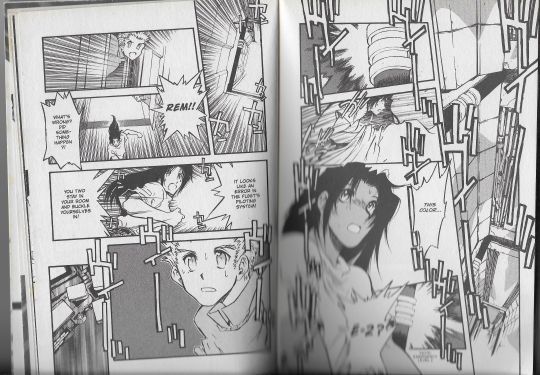
So, I've been thinking about one of the details in Trigun: Stampede that was not present in either '98 or the manga.
In '98, Knives just hacking into the SEEDS codes was left as-is. He walked up to Captain Joey and shot him and apparently took his pilot's seat. Did the Captain have the navigation open at the time? Was it closed and Knives had to do some hacking? Anyway, there, he did it on his own.
Now, in Trigun Maximum, which treats Vash and Knives' childhood differently (just Rem there raising them), there is a foreshadowing of what is to come.
In Volume 6, Rem is depicted waking up to an emergency signal in the middle of her sleeping-hours. (Aw, she sleeps in her regular clothes, mom-jeans and all...). Panicked, she yells at Knives for him and Vash to lock themselves in their rooms and not to come out or speak up for ANY reason, even if they hear voices outside.
She tries to handle the situation, but it goes from bad to worse and the automatic crew-wakening protocol goes into effect, which she is very concerned about (for reasons that we who have read the manga know about)!
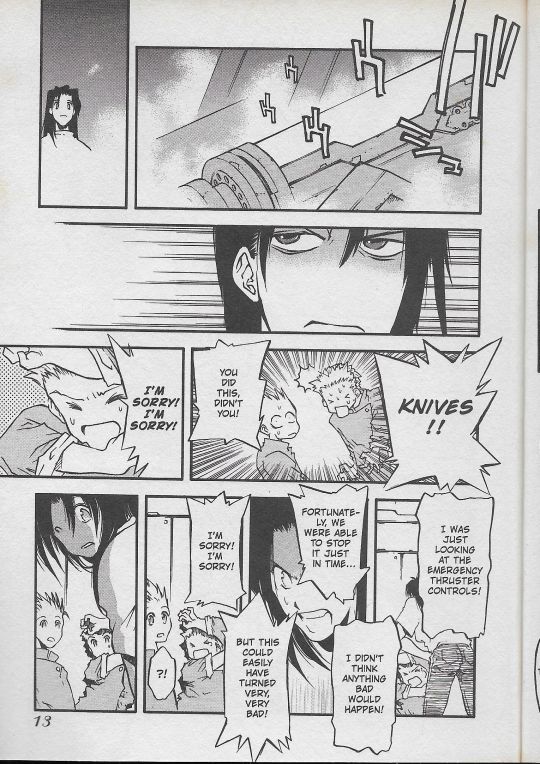
In the beginning of Volume 7 the crew wakes up, there's a situation-update. The ships are going off-course and will collide if things are not corrected. They're working through the issues and suddenly, there's an unknown factor that kicks in to correct the course. Rem then gets the crew all settled back in again for nappy-time...
And proceeds immediately to Vash and Knives, where she scolds Knives with (Rem's angry mom-face, my beloved)!
Knives was playing around with the ship codes and systems. He'd apparently hacked his way into the system and was curious about SEEDS' functions. (One would assume that Rem changed some of the codes after this, but I bet they were in some kind of hacking-war, with her trying to stay one step above curious Plant-twins). Knives did not mean to nearly cause a catastrophe, but this shows that he can and is a foreshadowing to when he DOES mean to cause one later.
Now, in Trigun Stampede, it is stated by Nai / Knives that Vash gave him the ship-codes, also that he spent a lot of time and trouble changing the codes for every human ship. (The manga lists the ship they are born on as the Mothership, presumably guiding the entire fleet, in Stampede, it is just Ship 5, which implies multiple guides with multiple navigators).
I am wondering where Studio Orange is going with this.
Will it be a situation like the manga where the kids are just playing around? Little prank-war with Rem? Maybe Vash is sharing a ship code innocently, as part of their games?
Or is it going to be darker, more sinister? I wonder if Vash was originally of the thought of "maybe we need to crash the ships and kill all humans (except Rem) because they're scary and dangerous because of what happened to Tesla" and then had a change of heart and backed out of it? - I can see that happening... him having his cathartic alone-time with Rem as in the manga and then talking things out with Nai and thinking that they weren't going to go through with it. And then Nai betrays him.
I've been wondering about the guilt Vash carries over the Big Fall in Stampede. Is it an unnecessary, undue guilt like he seems to have about a lot of things? Or is there a guilt born from "I had originally planned disaster / we had originally planned disaster" and it came true even after he'd backed out?
It's just that... in both '98 and Maximum, he does carry his cross (that is not Wolfwood's), but he seems to feel less specifically guilty over this (the Big Fall). He's really more like "Knives, how could you do this to everyone / Rem?!" He just seems more guilt-ridden in Stampede than in the other media and I am wondering if there is a dark secret behind it.
I can see it going either way.
#trigun#trigun maximum#trigun stampede#vash the stampede#millions knives#rem saverem#project SEEDS#The Big Fall#trigun analysis#trigun stampede analysis#I really want vash to be innocent in this and it being just him and knives messing around#because I'd rather have the stabby moment to be Vash's dance with darkness#because I really really like the stabby moment#although stampede already messed that up by having Rem just talk about a story about blank tickets#rather than have it be from a personal dream#where's my train-dream stampede?!#I think the train-dream is important to me because I had something similar at a point in my life#before I discovered trigun#I thought my future was tanked because something didn't go as planned#cue me dreaming of an open desert road that lead to anywhere#I woke up refreshed#I also don't want to go back and change my fanfiction
91 notes
·
View notes
Text
Okay, while I was taking screenshots of the manga pages for my analysis of Knives/Legato relationship in TriMax, something occurred to me. Yet another unpopular opinion, I guess:
Knives treated Legato well before the July incident, and here is why I think so.
First, there is this flashback, in which we see Legato, still a teenager, catching up with Elendira and Knives. We see that Knives's face is rather stern, but when he sees Legato beside him, he smiles. And that smile looks sincere, like when Vash smiles at children.
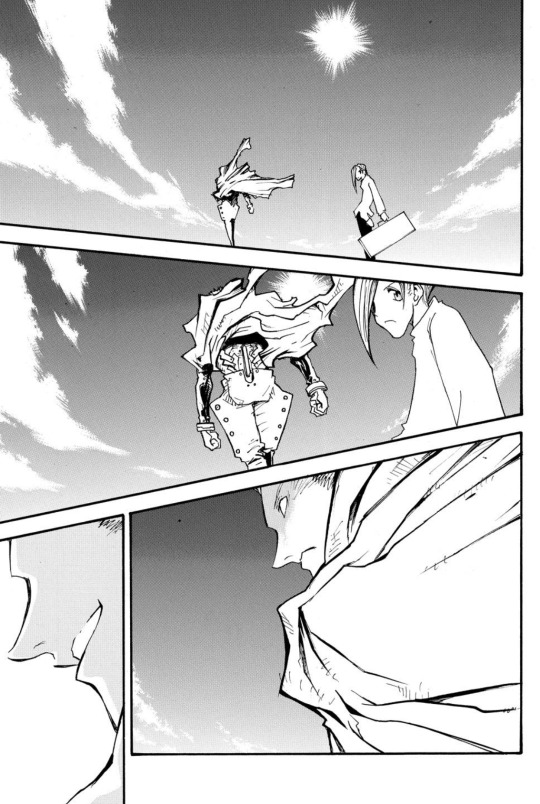
Second, Legoto looks perfectly healthy at the time of the July incident. Clear-eyed, no bags under his eyes, no impression of him trying to hide his face behind his bangs. He's obviously been taken good care of.

Third, look how grief-stricken Legato was when he thought Knives was dead.

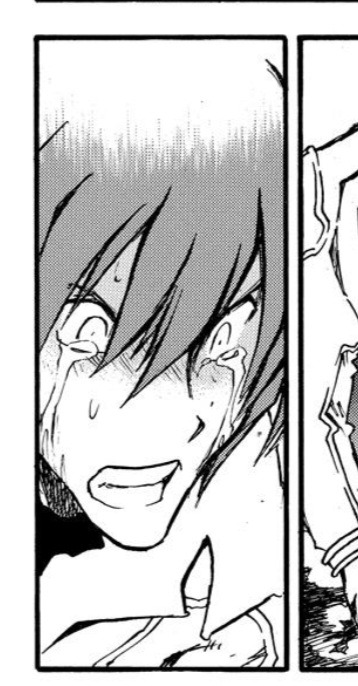
Many people forget that Legato was willing to kill his abusers in an incredibly cruel way. And he included in the list of abusers not only the people who hurt him themselves, but also those who allowed it to happen.

I doubt he would weep like that over someone who treated him badly. If Legato followed Knives only out of loyalty and tolerated bad treatment out of religious awe, he would probably see Vash as a stronger god.
Fourth, when Knives wakes up and starts talking to Legato very rudely, we see shock and confusion on Legato's face, as if Knives had never spoken to him like that before.
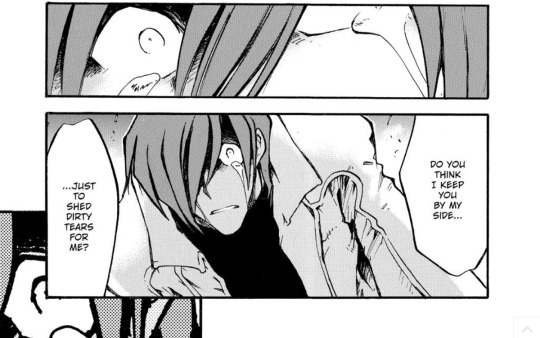
And the last thing is Legato's conviction that Knives' cruelty toward him was Vash's fault, as if he hadn't shown up, things would have been fine between him and Knives.
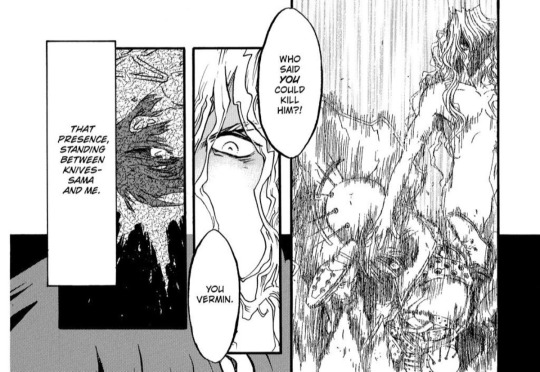
279 notes
·
View notes
Text
C/W for SA and spoilers for Trigun Maximum
I finally can verbalize my thoughts on why the Angel arm situation is so fucked up even if you don’t look at it through a lens of it being sexual assault. Knives completely disregards the autonomy of anyone hes In contact with. Even the dependent plants, who he sees as his sisters. But Vash-his own fucking brother who he claims to love- is not afforded any autonomy. Because when it comes down to it knives doesn’t care. The Angel arm incident is to directly show how powerless Vash is. That Vash isn’t even allowed control over his own powers, but Knives is. Knives violates Vash’s bodily autonomy and makes him go against his principles (which at the time are the only things he’s living for!!) as a show of power. A “look at this, your ideals mean nothing because you’re too weak to uphold them.”
I think this along with the very obvious metaphors for SA is what makes this scene so gut wrenching. It’s Vash trying to hang on to his personhood, and this is one of the very few times we see him do it. Vash barely ever actively fights to protect himself, he mainly just dodges and runs. Except for his fights with Knives and a couple of the Gung-ho-Guns. Vash is actively fighting and being overpowered and that’s why it’s so disturbing
#ooooooh knives millions when I catch you#there are very few characters I despise as much as knives mother fucking millions#the Angel arm incident at juneora rock made me sick#trigun#trimax#trigun stampede#vash the stampede#trigun maximum#millions knives#Angel Arm#analysis#trigun analysis#cw sa mention
109 notes
·
View notes
Text
Knives Millions has this weird habit...
Lots of folks have noticed that Knives has this Thing™️ about taking people's arms off, especially in Stampede. He did it to 4 people, cutting 5 arms off, in E3 alone. That's just his first apperance.
So today, it hit me: it's just like the classic example of early psychopathic behavior in boys - pulling the wings off of flies.
This is really good characterization, because it tells you exactly how little he thinks of humanity. They are like insects to him. It also foreshadows what is confirmed in E5, which is that he is playing god.
80 notes
·
View notes
Text
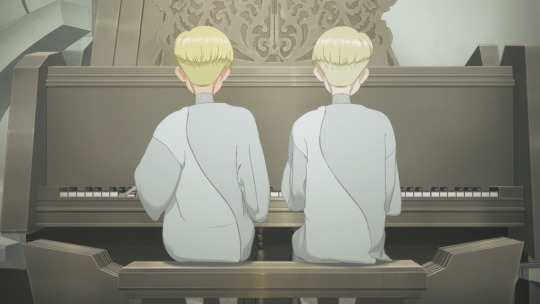
WAIT A MINUTE!!! SO, THESE TWO CAN PLAY THE PIANO?? (ep 9 preview images)

AND THAT’S WHY VASH RECOGNIZED KNIVES PLAYING??

WAS HE CALLING VASH???
#trigun#trigun stampede#analysis#vash#questions#vash the stampede#vash stampede#million knives#trigun spoilers#ts spoilers#trigun stampede spoilers#trigun vash#trigun analysis#trigun anime#millions knives
550 notes
·
View notes
Text
Big Glass Onion Knives Out spoilers below, do not read if you haven't seen the movie!
Analyzing *that scene* at the end of Glass Onion
Someone has probably already talked about this, but the glass smashing scene! I cannot stop thinking about that scene because of how it DIRECTLY parallels Miles's speech about being a disruptor.
"If you want to shake things up, you start with something small. You break a norm, or an idea, or a convention, some little business model. But you go with things that people are kind of tired of anyway."
Miles has a giant room full of glass statues. Hell, his big fancy dome is called the Glass Onion, so easly breakable with all of its glass panes. He has a lot of it and it would all be so easy to knock over and destroy with one wrong step, and we see Peg almost do just that very early on.
And when Helen starts grabbing them and smashing them? Miles laughs. To him, she is a small, insignificant person who thinks she can get back at him by smashing some (probably very expensive) sculptures. But they don't actually matter - he can always buy more. They will always be replaceable. But she doesn't stop.
"Everybody gets excited because you're busting up something that everyone wanted broken in the first place. That's the infraction point."
The others start to cheer her on. They want these broken too. They wanna do something that makes them feel a little better, like they've gotten back at Miles a little bit. So they cheer her on and then they join in. They smash glass and cheer and you can tell that they're having a lot of fun with it.
Does it help anything? No. Does it change the fact that they've turned their back on Andi and Helen? No. Does it actually do anything to screw over Miles or reject the conditions of his monetary support? Nope.
It's just a bit of fun for them to take the edge off.
"That's the place where you have to look within yourself and ask, 'Am I the kind of person who will keep going?' Will you break more things? Break bigger things?"
They've had their fun, hell, even Miles partook and smashed the cup he was holding because none of it fucking matters.
But Helen keeps going. She doesn't stop at the statues. She pushes.
"Are you willing to break the thing that nobody wants you to break? Because at that point, people are not gonna be on your side. They're gonna call you crazy. They're gonna say you're a bully. They're gonna tell you to stop."
They tell Helen to go easy, to calm down.
She smashes the piano and you can see they're all concerned. Birdie comments that she thinks the piano belonged to Liberace. The glass statues were fun, but this piano is important and how dare you break it.
She smashes the bar cart and everyone is getting more worried. Miles is getting mad. He tries to bargain with her, asks her what she wants because now he's upset, Helen has taken things farther than she was supposed to.
And then she takes the lighter and sets it ablaze.
They tell Helen to stop, to wait. They tell her enough, that she needs to be done now because they're uncomfortable. They had their fun and didn't sign up for anything meaningful to actually happen.
Even your partner will say, 'You need to stop.'
The line about your partner is the only one that doesn't hold true.
Blanc was Helen's partner in all of this and he was the one who told her to keep going, he was the one who handed her the solid hydrogen, who told her to remember why her sister walked away, and by doing so gave her the green light (even though she didn't need his permission) to burn it all down.
"Because as it turns out, nobody wants you to break the system itself. But that is what true disruption is. And that is what unites all of us. We all got to that line and crossed it."
Helen finds the line - she throws the Klean fuel and everything explodes in their faces.
And then the ultimate crossing of the line, their horrified faces as they realize what she is about to do as she lunges for the Mona Lisa and it goes up in flames. Nobody wants you to break the system and everyone is terrified when you do.
Helen crosses the line, burns Miles's whole empire down in the process.
All of Andi's friends just reshaped the systems to serve themselves.
Helen is the only one of them who ever crossed a meaningful line.
990 notes
·
View notes